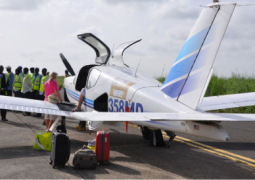The plane crashed in a Namibian national park near the border with Angola and there were no survivors, Namibia’s deputy police commissioner, Bollen Sankwasa, said.
The plane was carrying 27 passengers, including 10 Mozambicans, nine Angolans, five Portuguese, and one citizen each from France, Brazil and China, the airline said. Six crew members were on board.
The sudden incident came at a time when many are now skeptical about the safety of some of our airlines, and are even suggesting a world blacklist of carriers deemed unsafe.
Yet this is no time for bickering; it is time for action.
It is up to the international community, for instance, to release its blacklist of carriers with immediate effect so that prospective passengers would have a reasonable degree of assurance that the plane they are about to board is not a ‘flying coffin’. This is the feeling all around at the moment.
In fact, airlines from Mozambique are among carriers banned in the European Union because of safety concerns.
Besides, many others who remain skeptical about the air-worthiness of some of the airlines, especially those operating in some parts of Africa, other regional bodies and African governments, in particular, should and must be seen to take immediate steps to compile lists of aircraft that are no longer airworthy.
In compiling this list, nothing should be taken for granted. The overriding consideration should be the safety of people.
Though accidents do happen, some of the air crashes could have been avoided if more care had been taken to carry out a rigorous inspection prior to departure.
As an immediate measure, planes that are no longer airworthy should be grounded without delay. Extra inspection should be conducted on aircraft shortly before their departure.
Pilots should be extra vigilant about the state of their aircraft; they should not at any point in time ignore any abnormality in their aircraft.
“If you’re not part of the solution, you’re part of the problem”.
Eldridge Cleaver



